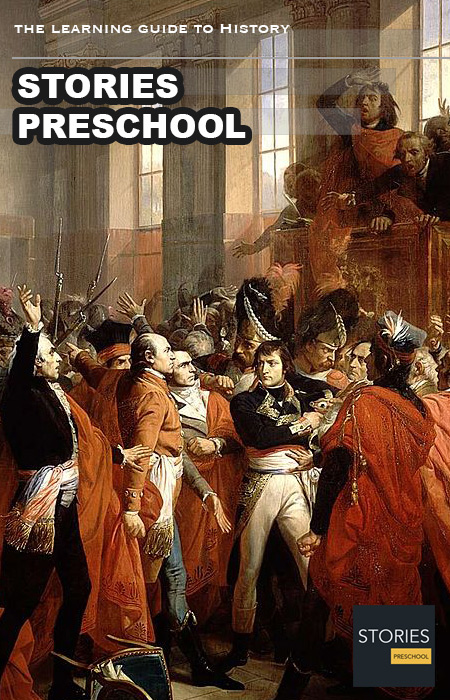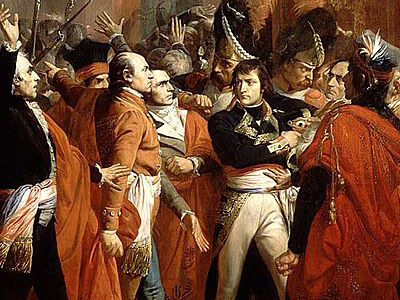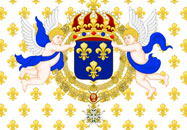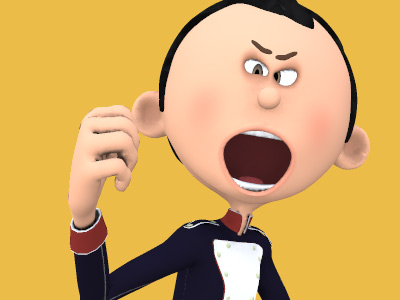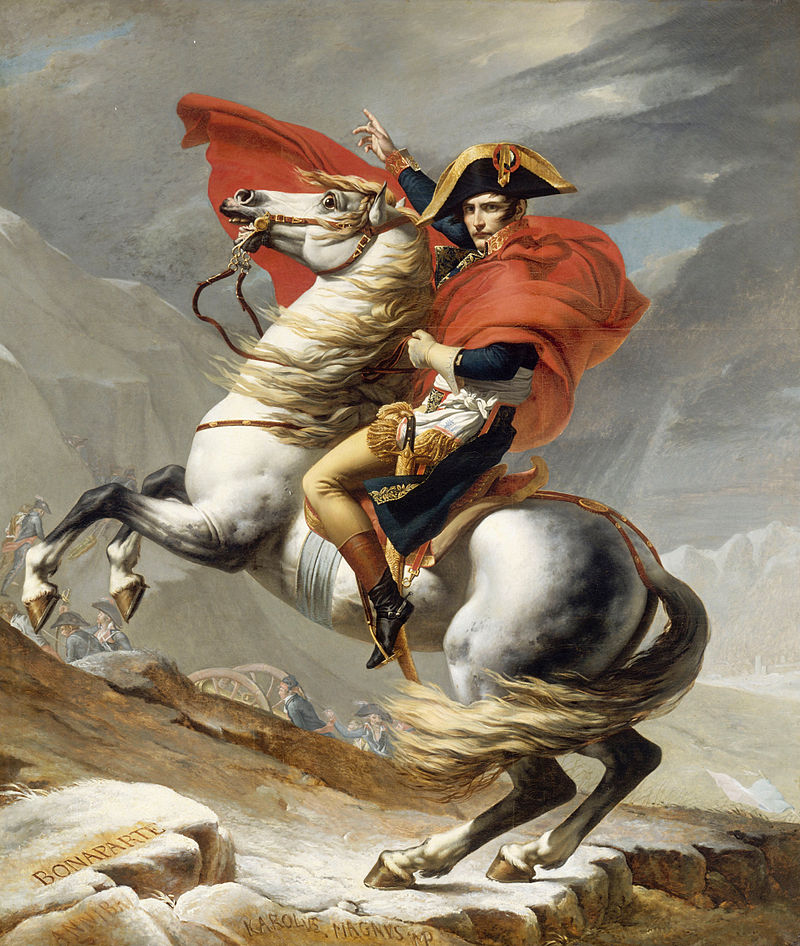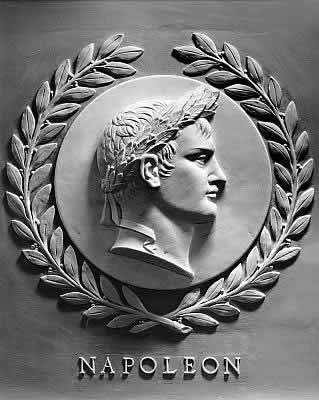Napoleon Bonaparte (1769-1821)
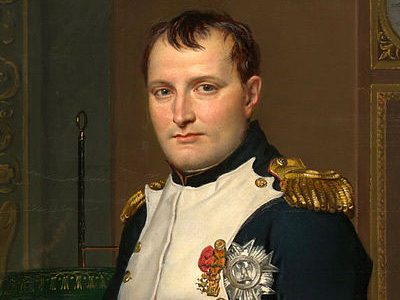
Napoleon Bonaparte (Napoléon Bonaparte; /nəˈpoʊliən, -ˈpoʊljən/; French: [napɔleɔ̃ bɔnapaʁt], Italian: [napoleoŋe bɔŋaparte], born "Napoleone di Buonaparte" (Italian: [napoleoŋe dj buɔŋaparte]); 15 August 1769 – 5 May 1821) was a French military and political leader who rose to prominence during the French Revolution and led several successful campaigns during the French Revolutionary Wars. As Napoleon I, he was Emperor of the French from 1804 until 1814, and again in 1815. Napoleon dominated European and global affairs for more than a decade while leading France First French Empire, officially the French Republic, then the French Empire after 1809, also known as Napoleonic France, was the empire ruled by Napoleon Bonaparte, who established French hegemony over much of continental Europe at the beginning of the 19th century. It lasted from 18 May 1804 to 11 April 1814 and again briefly from 20 March 1815 to 7 July 1815. A series of wars, known collectively as the Napoleonic Wars, extended French influence to much of Western Europe and into Poland. against a series of coalitions in the Napoleonic Wars. He won most of these wars and the vast majority of his battles, building a large empire that ruled over continental Europe before its final collapse in 1815. One of the greatest commanders in history, his wars and campaigns are studied at military schools worldwide. Napoleon's political and cultural legacy has ensured his status as one of the most celebrated and controversial leaders in human history.
First French Empire, officially the French Republic, then the French Empire after 1809, also known as Napoleonic France, was the empire ruled by Napoleon Bonaparte, who established French hegemony over much of continental Europe at the beginning of the 19th century. It lasted from 18 May 1804 to 11 April 1814 and again briefly from 20 March 1815 to 7 July 1815. A series of wars, known collectively as the Napoleonic Wars, extended French influence to much of Western Europe and into Poland. against a series of coalitions in the Napoleonic Wars. He won most of these wars and the vast majority of his battles, building a large empire that ruled over continental Europe before its final collapse in 1815. One of the greatest commanders in history, his wars and campaigns are studied at military schools worldwide. Napoleon's political and cultural legacy has ensured his status as one of the most celebrated and controversial leaders in human history.
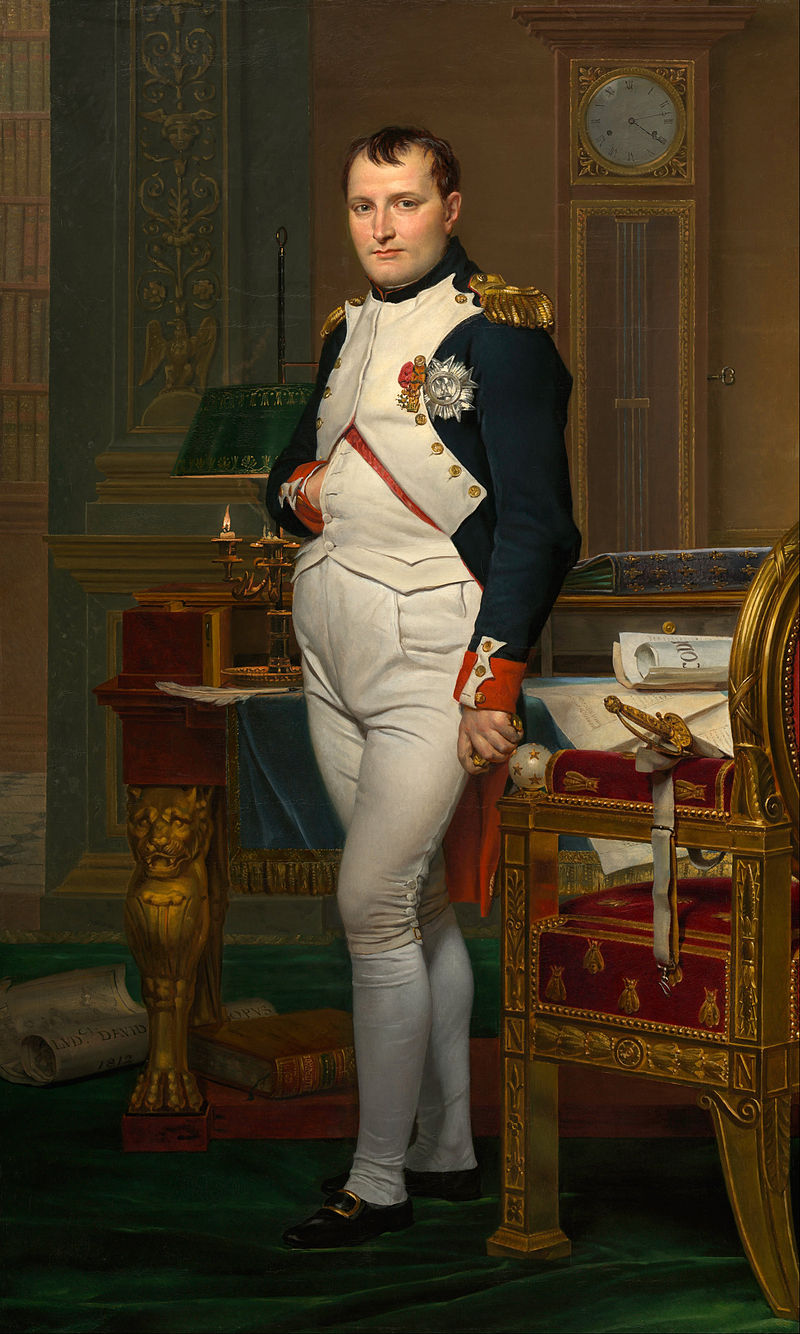
He was born in Corsica to a relatively modest family from the minor nobility. When the Revolution broke out in 1789, Napoleon Napoleon Bonaparte (1769-1821), was a French military and political leader who rose to prominence during the French Revolution and led several successful campaigns during the French Revolutionary Wars. As Napoleon I, he was Emperor of the French from 1804 until 1814, and again in 1815. One of the greatest commanders in history, his wars and campaigns are studied at military schools worldwide. Napoleon Bonaparte » was serving as an artillery officer in the French army. Seizing the new opportunities presented by the Revolution, he rapidly rose through the ranks of the military, becoming a general at age 24. The Directory eventually gave him command of the Army of Italy after he suppressed a revolt against the government from royalist insurgents. At age 26, he began his first military campaign against the Austrians and their Italian allies—winning virtually every battle, conquering the Italian Peninsula in a year, and becoming a national hero. In 1798, he led a military expedition to Egypt that served as a springboard to political power. He engineered a coup in November 1799 and became First Consul of the Republic. His ambition and public approval inspired him to go further, and in 1804 he became the first Emperor of the French. Intractable differences with the British
Napoleon Bonaparte (1769-1821), was a French military and political leader who rose to prominence during the French Revolution and led several successful campaigns during the French Revolutionary Wars. As Napoleon I, he was Emperor of the French from 1804 until 1814, and again in 1815. One of the greatest commanders in history, his wars and campaigns are studied at military schools worldwide. Napoleon Bonaparte » was serving as an artillery officer in the French army. Seizing the new opportunities presented by the Revolution, he rapidly rose through the ranks of the military, becoming a general at age 24. The Directory eventually gave him command of the Army of Italy after he suppressed a revolt against the government from royalist insurgents. At age 26, he began his first military campaign against the Austrians and their Italian allies—winning virtually every battle, conquering the Italian Peninsula in a year, and becoming a national hero. In 1798, he led a military expedition to Egypt that served as a springboard to political power. He engineered a coup in November 1799 and became First Consul of the Republic. His ambition and public approval inspired him to go further, and in 1804 he became the first Emperor of the French. Intractable differences with the British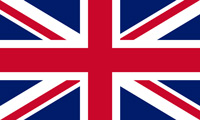 The British Empire, was composed of the dominions, colonies, protectorates, mandates, and other territories ruled or administered by the United Kingdom and its predecessor states. At its height it was the largest empire in history and, for over a century, was the foremost global power. By the start of the 20th century, Germany and the United States had begun to challenge Britain's economic lead. meant that the French were facing a Third Coalition by 1805. Napoleon shattered this coalition with decisive victories in the Ulm Campaign and a historic triumph over Russia
The British Empire, was composed of the dominions, colonies, protectorates, mandates, and other territories ruled or administered by the United Kingdom and its predecessor states. At its height it was the largest empire in history and, for over a century, was the foremost global power. By the start of the 20th century, Germany and the United States had begun to challenge Britain's economic lead. meant that the French were facing a Third Coalition by 1805. Napoleon shattered this coalition with decisive victories in the Ulm Campaign and a historic triumph over Russia Russian Empire was an empire and the final period of the Russian monarchy from 1721 to 1917, ruling across large parts of Eurasia. The rise of the Russian Empire coincided with the decline of neighbouring rival powers: the Swedish Empire, the Polish–Lithuanian Commonwealth, Qajar Iran, the Ottoman Empire, and Qing China. Russia remains the third-largest empire in history, surpassed only by the British Empire and the Mongol Empire. and Austria at the Battle of Austerlitz, which led to the elimination of the thousand year-old Holy Roman Empire. In 1806, the Fourth Coalition took up arms against him because Prussia
Russian Empire was an empire and the final period of the Russian monarchy from 1721 to 1917, ruling across large parts of Eurasia. The rise of the Russian Empire coincided with the decline of neighbouring rival powers: the Swedish Empire, the Polish–Lithuanian Commonwealth, Qajar Iran, the Ottoman Empire, and Qing China. Russia remains the third-largest empire in history, surpassed only by the British Empire and the Mongol Empire. and Austria at the Battle of Austerlitz, which led to the elimination of the thousand year-old Holy Roman Empire. In 1806, the Fourth Coalition took up arms against him because Prussia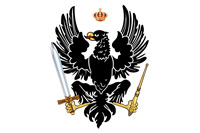 The Kingdom of Prussia was a German kingdom that constituted the state of Prussia between 1701 and 1918. It was the driving force behind the unification of Germany in 1871 and was the leading state of the German Empire until its dissolution in 1918. Although it took its name from the region called Prussia, it was based in the Margraviate of Brandenburg. Its capital was Berlin. became worried about growing French influence on the continent. Napoleon quickly defeated Prussia at the battles of Jena and Auerstedt, then marched the Grand Army deep into Eastern Europe and annihilated the Russians in June 1807 at the Battle of Friedland. France then forced the defeated nations of the Fourth Coalition to sign the Treaties of Tilsit in July 1807, bringing an uneasy peace to the continent. Tilsit signified the high watermark of the French Empire. In 1809, the Austrians and the British challenged the French again during the War of the Fifth Coalition, but Napoleon solidified his grip over Europe after triumphing at the Battle of Wagram in July.
The Kingdom of Prussia was a German kingdom that constituted the state of Prussia between 1701 and 1918. It was the driving force behind the unification of Germany in 1871 and was the leading state of the German Empire until its dissolution in 1918. Although it took its name from the region called Prussia, it was based in the Margraviate of Brandenburg. Its capital was Berlin. became worried about growing French influence on the continent. Napoleon quickly defeated Prussia at the battles of Jena and Auerstedt, then marched the Grand Army deep into Eastern Europe and annihilated the Russians in June 1807 at the Battle of Friedland. France then forced the defeated nations of the Fourth Coalition to sign the Treaties of Tilsit in July 1807, bringing an uneasy peace to the continent. Tilsit signified the high watermark of the French Empire. In 1809, the Austrians and the British challenged the French again during the War of the Fifth Coalition, but Napoleon solidified his grip over Europe after triumphing at the Battle of Wagram in July.
Hoping to extend the Continental System and choke off British trade with the European mainland, Napoleon invaded Iberia and declared his brother Joseph the King of Spain in 1808. The Spanish and the Portuguese revolted with British support. The Peninsular War lasted six years, featured extensive guerrilla warfare, and ended in victory for the Allies. The Continental System caused recurring diplomatic conflicts between France and its client states, especially Russia. Unwilling to bear the economic consequences of reduced trade, the Russians routinely violated the Continental System and enticed Napoleon into another war. The French launched a major invasion of Russia in the summer of 1812. The resulting campaign witnessed the collapse of the Grand Army, the destruction of Russian cities, and inspired a renewed push against Napoleon by his enemies. In 1813, Prussia and Austria joined Russian forces in a Sixth Coalition against France. A lengthy military campaign culminated in a large Allied army defeating Napoleon at the Battle of Leipzig in October 1813. The Allies then invaded France and captured Paris in the spring of 1814, forcing Napoleon to abdicate in April. He was exiled to the island of Elba near Rome and the Bourbons were restored to power. However, Napoleon escaped from Elba in February 1815 and took control of France once again. The Allies responded by forming a Seventh Coalition, which defeated Napoleon at the Battle of Waterloo in June. The British exiled him to the remote island of Saint Helena in the South Atlantic, where he spent the remainder of his years. His death in 1821 at the age of 51 was received with surprise, shock, and grief throughout Europe, leaving behind a memory that still persists.
Napoleon had an extensive and powerful influence on the modern world, bringing liberal reforms to the numerous territories that he conquered and controlled, such as the Low Countries, Switzerland, and large parts of modern Italy and Germany. He implemented fundamental liberal policies in France and throughout Western Europe. His legal achievement, the Napoleonic Code, has influenced the legal systems of more than 70 nations around the world. British historian Andrew Roberts stated, "The ideas that underpin our modern world—meritocracy, equality before the law, property rights, religious toleration, modern secular education, sound finances, and so on—were championed, consolidated, codified and geographically extended by Napoleon. To them he added a rational and efficient local administration, an end to rural banditry, the encouragement of science and the arts, the abolition of feudalism and the greatest codification of laws since the fall of the Roman Empire."
Personality
Historians emphasize the strength of the ambition that took Napoleon from an obscure village to command of most of Europe. George F. E. Rudé stresses his "rare combination of will, intellect and physical vigour." At 5 ft 6 in (168 cm), he was not physically imposing but in one-on-one situations he typically had a hypnotic effect on people and seemingly bent the strongest leaders to his will. He understood military technology, but was not an innovator in that regard. He was an innovator in using the financial, bureaucratic, and diplomatic resources of France. He could rapidly dictate a series of complex commands to his subordinates, keeping in mind where major units were expected to be at each future point, and like a chess master, "seeing" the best plays moves ahead.
Napoleon maintained strict, efficient work habits, prioritizing what needed to be done. He cheated at cards, but repaid the losses; he had to win at everything he attempted. He kept relays of staff and secretaries at work. Unlike many generals, Napoleon did not examine history to ask what Hannibal or Alexander or anyone else did in a similar situation. Critics said he won many battles simply because of luck; Napoleon responded, "Give me lucky generals," aware that "luck" comes to leaders who recognize opportunity, and seize it. Dwyer states that Napoleon's victories at Austerlitz and Jena in 1805–06 heightened his sense of self-grandiosity, leaving him even more certain of his destiny and invincibility.
In terms of influence on events, it was more than Napoleon's personality that took effect. He reorganized France itself to supply the men and money needed for wars. He inspired his men—Wellington said his presence on the battlefield was worth 40,000 soldiers, for he inspired confidence from privates to field marshals. He also unnerved the enemy. At the Battle of Auerstadt in 1806, King Frederick William III of Prussia outnumbered the French by 63,000 to 27,000; however, when he was told, mistakenly, that Napoleon was in command, he ordered a hasty retreat that turned into a rout. The force of his personality neutralized material difficulties as his soldiers fought with the confidence that with Napoleon in charge they would surely win.
HISTORY
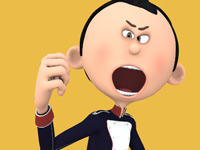
RESOURCES
This article uses material from the Wikipedia article "Napoleon", which is released under the Creative Commons Attribution-Share-Alike License 3.0.
© Stories Preschool. All Rights Reserved.
